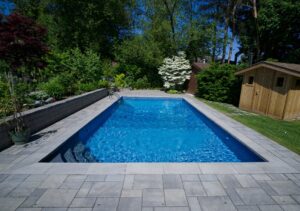 Staycations have become popular in Ontario over the last few years. With Ontario summers typically hovering around 30 degrees, a backyard pool is a great addition to your home, allowing you to enjoy the outdoors without the need to leave your property. And when you add some landscaping features around the pool such as a spill-over spa and a sheer descent waterfall, you can transform your backyard into a relaxing oasis that you can enjoy all summer long.
Staycations have become popular in Ontario over the last few years. With Ontario summers typically hovering around 30 degrees, a backyard pool is a great addition to your home, allowing you to enjoy the outdoors without the need to leave your property. And when you add some landscaping features around the pool such as a spill-over spa and a sheer descent waterfall, you can transform your backyard into a relaxing oasis that you can enjoy all summer long.
But before taking the plunge and calling a pool installer, it would be good to familiarize yourself with the various options available when it comes to swimming pools. You can go with an above-ground pool or an inground pool. When deciding to install an inground swimming pool, choosing what material to use is the first step. The most popular materials for inground pools in Ontario are vinyl, fiberglass and concrete. Each have their pros and cons, and for this article, we outline the benefits of vinyl inground swimming pools as compared to concrete and fiberglass.
